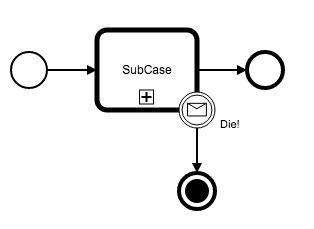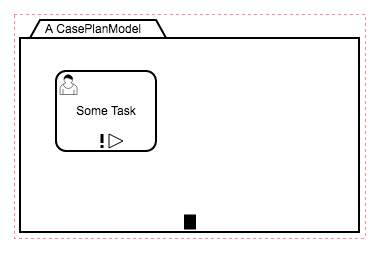A case instance is terminated by terminating the parent process instance via message correlation triggering a terminating event.

The case instance itself spawned a human task that is still active after the parent process and the case instance itself is already terminated.

This also makes it impossible to “complete” the task, though that should probably not be an option anyway, triggering a NullPointerException as the superExecution is gone:
Caused by: java.lang.NullPointerException
at org.camunda.bpm.engine.impl.cmmn.entity.runtime.CaseExecutionEntity.setSuperExecution(CaseExecutionEntity.java:468)
at org.camunda.bpm.engine.impl.cmmn.operation.AbstractAtomicOperationCaseExecutionComplete.postTransitionNotification(AbstractAtomicOperationCaseExecutionComplete.java:98)
at org.camunda.bpm.engine.impl.cmmn.operation.AbstractCmmnEventAtomicOperation.eventNotificationsCompleted(AbstractCmmnEventAtomicOperation.java:40)
at org.camunda.bpm.engine.impl.cmmn.operation.AbstractCmmnEventAtomicOperation.eventNotificationsCompleted(AbstractCmmnEventAtomicOperation.java:26)
at org.camunda.bpm.engine.impl.core.operation.AbstractEventAtomicOperation.execute(AbstractEventAtomicOperation.java:65)
at org.camunda.bpm.engine.impl.cmmn.operation.AbstractCmmnEventAtomicOperation.execute(AbstractCmmnEventAtomicOperation.java:26)
at org.camunda.bpm.engine.impl.interceptor.CommandContext.performOperation(CommandContext.java:214)
I’m not sure wether I’m doing something wrong so the termination of tasks is not triggered or if this is inadvertent behavior. I created a Unit test that may be helpful.
In my application I tried to do a simple workaround to delete case tasks before correlating the kill message like this:
final List<String> taskIds = taskService
.createTaskQuery().caseInstanceBusinessKey(businessKey).list()
.stream().map(Task::getId).collect(Collectors.toList());
taskService.deleteTasks(taskIds);
But that isn’t possible as the engine triggers:
org.camunda.bpm.engine.ProcessEngineException: The task cannot be deleted because is part of a running case instance
at org.camunda.bpm.engine.impl.cmd.DeleteTaskCmd.deleteTask(DeleteTaskCmd.java:73)
I’m not sure how to get rid of these tasks now.
EDIT:
I was wondering wether manually closing the case instance would be a solution here:
// Then the process instance should be ended
assertThat(processInstance.isEnded());
// as well as the case instance
assertThat(!caseInstance.isActive());
assertThat(!caseInstance.isCompleted());
assertThat(caseInstance.isTerminated());
caseService.closeCaseInstance(caseInstance.getId()); // throws exception
But while the above assertions succeed, the following exception is thrown closing the instance:
org.camunda.bpm.engine.exception.NotAllowedException: ENGINE-05008 Could not perform transition 'close on case execution with id '11'.Reason: The case instance must be in state '[completed|terminated|suspended]' to close it, but the state is 'active'.
at org.camunda.bpm.engine.impl.cmmn.CaseExecutionCommandBuilderImpl.executeCommand(CaseExecutionCommandBuilderImpl.java:237)
at org.camunda.bpm.engine.impl.cmmn.CaseExecutionCommandBuilderImpl.close(CaseExecutionCommandBuilderImpl.java:218)
at org.camunda.bpm.engine.impl.cmmn.CaseServiceImpl.closeCaseInstance(CaseServiceImpl.java:263)
at org.camunda.bpm.unittest.SimpleTestCase.shouldExecuteProcess(SimpleTestCase.java:93)
at sun.reflect.NativeMethodAccessorImpl.invoke0(Native Method)
at sun.reflect.NativeMethodAccessorImpl.invoke(NativeMethodAccessorImpl.java:62)
at sun.reflect.DelegatingMethodAccessorImpl.invoke(DelegatingMethodAccessorImpl.java:43)
at java.lang.reflect.Method.invoke(Method.java:497)
at org.junit.runners.model.FrameworkMethod$1.runReflectiveCall(FrameworkMethod.java:47)
at org.junit.internal.runners.model.ReflectiveCallable.run(ReflectiveCallable.java:12)
at org.junit.runners.model.FrameworkMethod.invokeExplosively(FrameworkMethod.java:44)
at org.junit.internal.runners.statements.InvokeMethod.evaluate(InvokeMethod.java:17)
at org.junit.rules.TestWatcher$1.evaluate(TestWatcher.java:55)
It looks like the case instance is in limbo between being active, terminated and closed with dangling tasks still active in the runtime database.